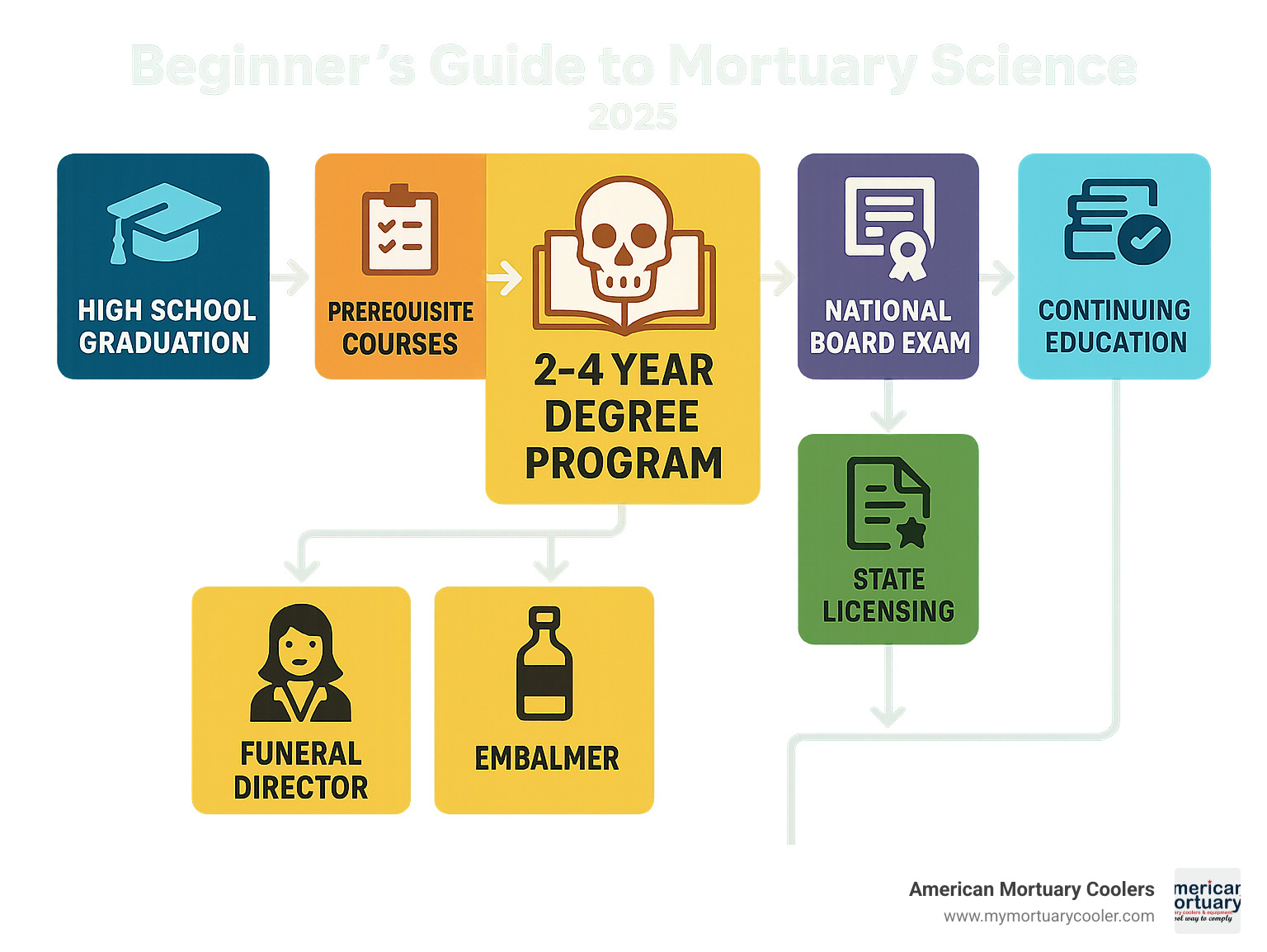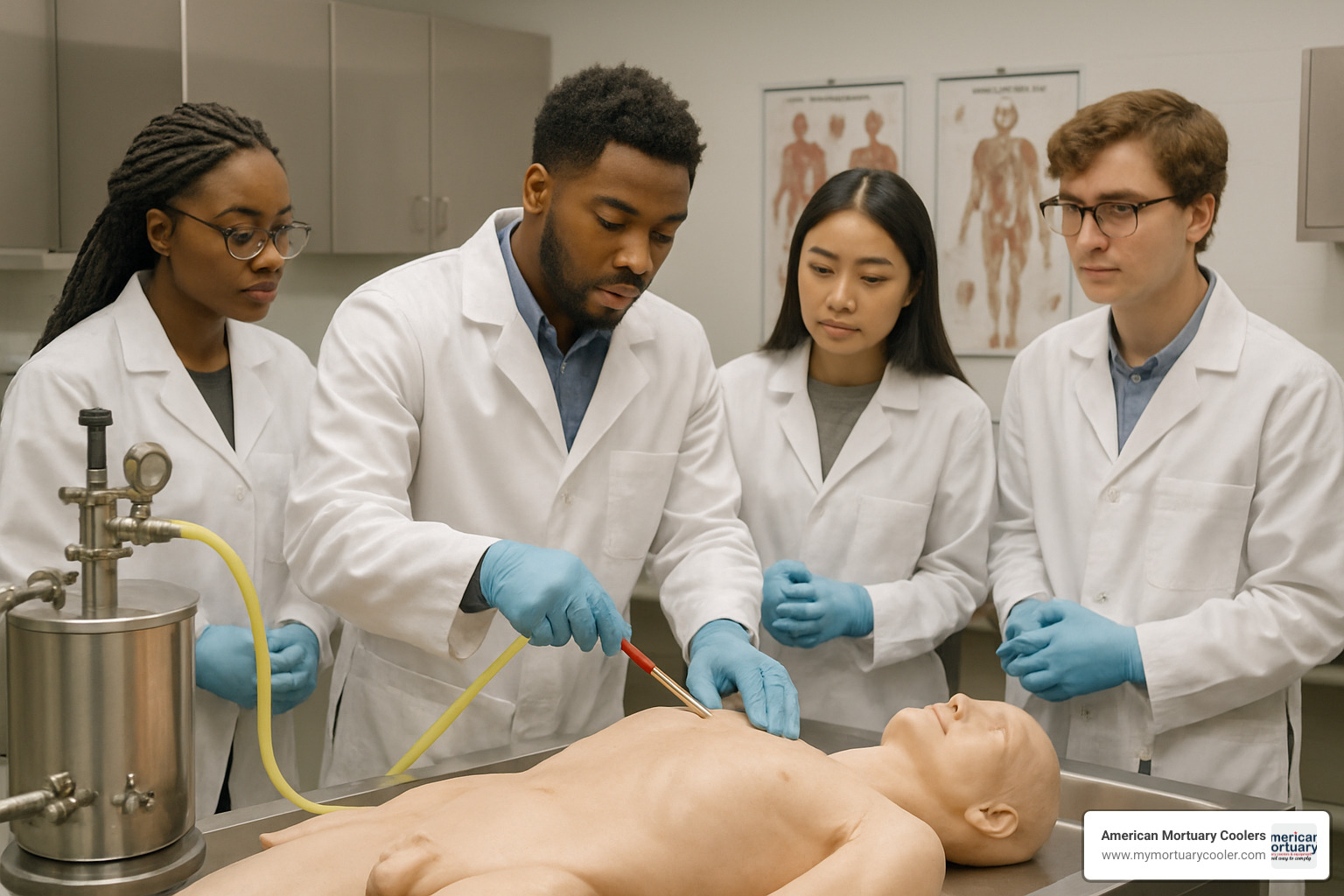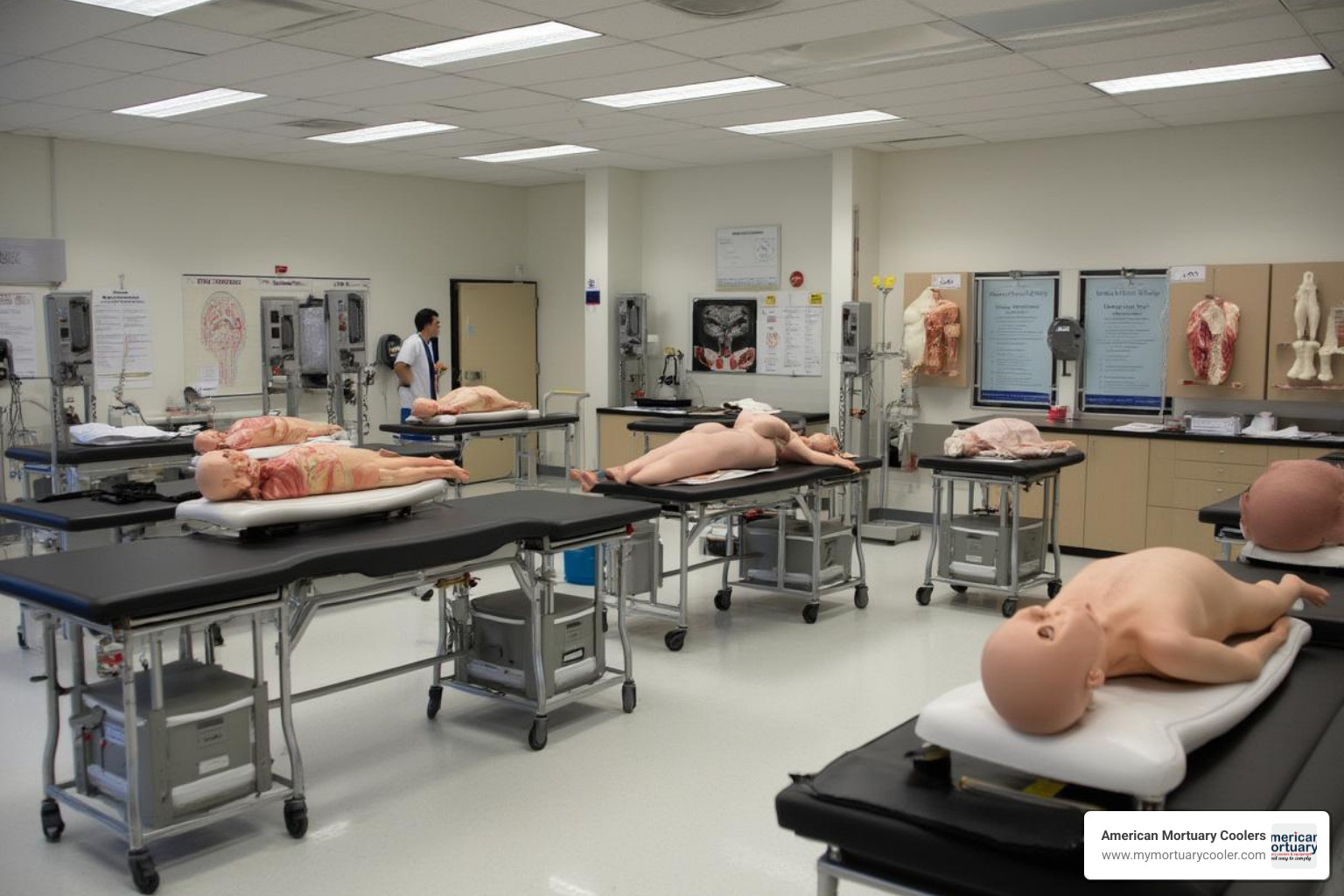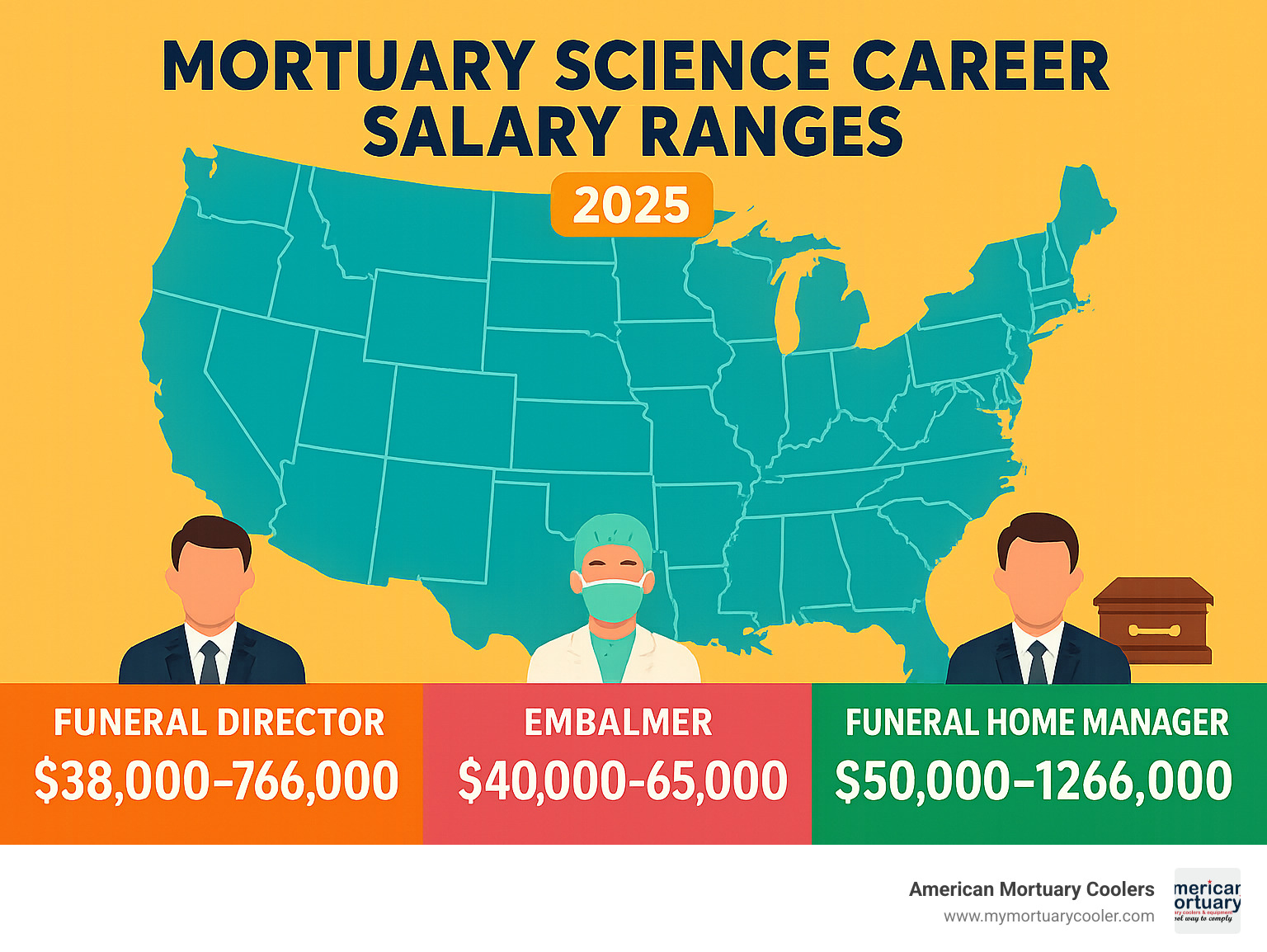Why mortuary-science Matters More Than Ever
Mortuary-science is the comprehensive study of deceased bodies and funeral service practices, combining scientific knowledge with compassionate care to serve families during their most difficult times. This field prepares professionals to handle everything from embalming and body preparation to grief counseling and business management.
Quick Overview of mortuary-science:
- Definition: Study of deceased bodies through mortuary work and funeral service practices
- Education: 2-4 year associate or bachelor's degree from ABFSE-accredited programs
- Licensing: National Board Exam + state licensing + 1-3 year apprenticeship
- Career Options: Funeral director, embalmer, mortician, funeral home owner
- Salary Range: $38,000-$126,000 annually (median: $54,100)
- Job Growth: 4-8% projected growth through 2033
The mortuary-science profession has evolved dramatically from ancient Egyptian embalmers to today's licensed professionals who blend chemistry, anatomy, psychology, and business skills. Modern funeral service workers must master everything from formaldehyde safety protocols to live-streaming memorial services.
Today's programs attract a diverse student body - over 70% of mortuary-science students are now women, completely reversing historical demographics. Whether you're drawn to the technical aspects of embalming, the interpersonal skills needed for family care, or the entrepreneurial opportunities in funeral home ownership, this field offers multiple career paths.
As funeral home director considering equipment needs, understanding the educational foundation of your staff helps you make informed decisions about facility requirements and professional development. I'm Mortuary Cooler, a national-level mortuary cooler supplier with extensive experience supporting mortuary-science education facilities and funeral homes across the country.

Mortuary-science terms you need:
What Is mortuary-science?
Mortuary-science is the fascinating blend of science, art, and compassion that prepares professionals to care for the deceased and support grieving families. Think of it as a unique field where chemistry meets psychology, where artistic restoration skills combine with business acumen, and where technical expertise serves one of humanity's most fundamental needs.
At its heart, mortuary-science teaches students to become skilled funeral directors, embalmers, and morticians who can handle everything from the scientific aspects of body preservation to the delicate art of helping families through their darkest hours.
The educational journey typically covers anatomy and physiology to understand how the human body works, chemistry and microbiology for safe preservation techniques, restorative art to help families say goodbye with dignity, and business management to run funeral operations effectively. Students also learn grief counseling, cultural sensitivity, and legal compliance.
Currently, over 43 accredited programs across more than thirty U.S. states offer mortuary-science education, with many now providing distance learning options to make this career path more accessible.
mortuary-science in Society: Past to Present
The story of mortuary-science begins over 4,000 years ago with Egyptian embalmers who developed preservation techniques so effective that their work still amazes us today. These ancient professionals understood that caring for the dead was both a sacred duty and a complex technical challenge.
The change into modern mortuary-science really accelerated during the 20th century. Embalming became standard practice, especially after its widespread use during the Civil War proved its value for families wanting to transport loved ones home for burial.
Perhaps the most dramatic change has been the complete gender shift in the profession. Historically dominated by men, the field began changing in the late 1900s. Today, over 70% of mortuary-science students are women, completely flipping the traditional demographics and bringing fresh perspectives to this ancient profession.
Key Titles Decoded: Funeral Director vs Embalmer vs Mortician vs Undertaker
A Funeral Director serves as the primary family contact and service coordinator. They handle the business side of funeral arrangements, plan memorial services, coordinate with cemeteries and clergy, and guide families through decisions.
An Embalmer focuses on the technical, scientific aspects of body preparation. They perform arterial embalming procedures, handle cavity treatments, apply preservation chemicals, and conduct restorative work to prepare the deceased for viewing.
A Mortician typically combines both funeral directing and embalming functions under one professional license. Most morticians can handle family consultations and embalming procedures, making them versatile professionals.
Undertaker is the old-school term that's largely disappeared from modern use. It originally described someone who "undertook" the practical arrangements for burial.
Education & Licensing Pathway

Becoming a licensed mortuary-science professional typically takes about four to six years from start to finish, depending on your state's requirements and whether you choose an associate or bachelor's degree program.
Most students start with a high school diploma or GED, then complete any required prerequisite courses before diving into their formal mortuary-science education. After graduation, you'll tackle the National Board Examination, followed by your state licensing exam, and finally complete a supervised apprenticeship.
The American Board of Funeral Service Education (ABFSE) acts as the quality gatekeeper for all legitimate programs. ABFSE accreditation ensures the program meets national standards and prepares you properly for licensure.
Getting Into mortuary-science Programs
Getting accepted into a mortuary-science program requires more than just good grades. Schools want to see that you understand what you're signing up for and have the right temperament for this unique field.
Most programs maintain annual student caps, making admission competitive. The application process typically requires a high school diploma or GED plus completion of prerequisite courses in subjects like biology, chemistry, psychology, and English composition.
Many programs require up to 40 hours of observation in a working funeral home before you can even apply. This helps you make an informed decision about whether this career path truly fits your personality and goals.
You'll also need a clean background check and valid driver's license. Some programs have minimum age requirements ranging from 18 to 21, depending on state regulations.
Hands-On Training & Apprenticeship Essentials
Mortuary-science education isn't something you can learn entirely from textbooks. From your very first semester, you'll be working with real human remains in carefully supervised laboratory settings.
The laboratory component includes human anatomy and physiology labs using cadavers, embalming practicum with donated specimens, and restorative art training where you learn cosmetic application and presentation techniques.
Many programs also include funeral arrangement simulations where you practice meeting with mock families, and business operations training covering legal documentation and funeral home management.
The apprenticeship phase is where everything comes together. You'll work in a licensed funeral home under experienced supervision, handling real cases and real families. This work-integrated learning phase typically lasts one to three years, depending on your state's requirements.
Licensing & Regulation: U.S. and Canada Compared
In the United States, each state maintains its own licensing board with unique requirements. The common thread is that most states require an ABFSE-accredited degree, passing the National Board Exam, passing a state-specific exam, and completing a supervised apprenticeship.
License renewal typically occurs every one to two years, with continuing education requirements that vary by state. For detailed requirements in your specific area, the National Funeral Directors Association licensing guide provides comprehensive state-by-state breakdowns.
Canada uses provincial regulation with different requirements across provinces. Students must verify specific licensing requirements with their Provincial Regulatory Board, especially if they plan to practice outside their program's home province.
Curriculum, Skills & Safety Inside the Classroom

Walking into a mortuary-science classroom for the first time can feel overwhelming. You'll see anatomical models, embalming equipment, and chemistry labs that look more like a medical school than a typical college setting.
Core mortuary-science Coursework
The foundation of your mortuary-science education starts with understanding the human body at a cellular level. Human anatomy and physiology classes use actual cadavers, giving you hands-on experience that textbooks simply can't provide.
Chemistry becomes your daily reality as you study embalming fluid composition and chemical reactions. Microbiology courses teach you to identify pathogens and implement infection control protocols that protect both you and the families you serve.
The pathology component helps you understand how different diseases affect the embalming process. Embalming theory and practice forms the technical heart of your education. You'll master both arterial injection and cavity treatment procedures through extensive hands-on training.
Restorative art classes teach reconstruction techniques for trauma cases, while mortuary cosmetology covers everything from makeup application to hair styling.
The business side is equally important. Funeral service administration covers everything from inventory management to staff scheduling. You'll also study funeral service law to understand the complex regulations governing your future profession.
Perhaps most importantly, you'll dive deep into the human side of death care. Thanatology - the study of death and dying - helps you understand the grief process. Funeral service counseling develops your communication skills for supporting bereaved families.
For a deeper understanding of how these scientific principles work together, The Science of Embalming: Chemistry, Microbiology, and Anatomy in Modern Preservation provides excellent insights into the technical aspects of your future work.
Personal Qualities & Emotional Resilience
Technical skills alone won't make you successful in mortuary-science. The professionals who thrive in this field develop strong emotional intelligence alongside their scientific knowledge.
Empathy is your most valuable tool, but it needs boundaries. You must genuinely care about families' pain without absorbing their grief as your own. Communication skills matter more than you might expect. You'll explain complex procedures to grieving families and coordinate with clergy and cemetery staff.
Attention to detail becomes second nature because mistakes in this field have serious consequences. Physical stamina is necessary for the lifting, positioning, and long hours that come with funeral service work.
Boundary setting protects your mental health while maintaining professional compassion. Successful funeral directors learn to leave work at work and develop healthy coping mechanisms.
Lab Risks & Safety Protocols
Mortuary-science education involves real health risks that require constant vigilance and strict safety protocols.
Formaldehyde exposure represents the most significant chemical risk in your education. This preservative chemical can cause respiratory irritation, skin reactions, and potentially more serious health effects with prolonged exposure. Proper ventilation systems and fume hoods are mandatory in all preparation areas.
Personal protective equipment isn't optional - it's your lifeline. Gloves, gowns, eye protection, and respirators must be worn during all embalming procedures.
Infectious disease risks are present with every body you encounter. Bloodborne pathogens including hepatitis B, hepatitis C, and HIV can survive in deceased tissue longer than many people realize. Universal precautions mean treating every case as potentially infectious.
The physical hazards are equally serious. Ergonomic injuries from improper lifting techniques can end careers before they start. Sharp instrument injuries from scalpels and trocars pose both immediate injury risk and potential disease transmission.
The risks are real, but they're manageable with proper training and consistent adherence to safety protocols.
Careers, Salaries & Future Trends

The mortuary-science field offers diverse career opportunities with stable employment prospects and competitive compensation.
Salary Range & Job Outlook
National Salary Data:
- Average Annual Salary: $58,200 (Bureau of Labor Statistics)
- Median Mortician Salary: $54,100 (2020 data)
- Funeral Service Workers Median: $58,170 (2020)
- Salary Range: Low $26,000, Average $53,000, High $126,000
Top-Paying States (May 2020):
- Connecticut: $126,000 average
- Minnesota: $81,630 ($40.38/hour)
- Massachusetts: $80,580
- Indiana: $75,410
- Delaware: $73,460
Employment Growth Projections:
- 4-8% growth projected from 2020-2030
- 2,500 additional jobs expected by 2033
- 25,000 morticians currently employed in the United States (2020)
- 61,000 total funeral service jobs as of 2023
The demographic shift toward an aging population drives steady demand for funeral services, providing job security in this field.
Technology Shaping Funerals
Modern mortuary-science professionals must adapt to rapidly evolving technology:
Digital Memorial Services:
- Live-streaming capabilities for remote attendance
- Virtual reality memorial experiences
- Digital guest books and online tributes
- Social media memorial management
Advanced Preservation Techniques:
- Alkaline hydrolysis (water cremation) as an eco-friendly option
- Improved embalming chemicals with reduced environmental impact
- Green burial and natural preservation methods
Business Technology:
- Funeral home management software
- Online arrangement platforms
- Digital payment processing
- Automated inventory management
The COVID-19 pandemic accelerated many of these technological adoptions, as funeral homes needed to adapt quickly to safety restrictions. Our experience supporting funeral homes during this period is detailed in The Role of Mortuary Coolers in Managing the COVID-19 Death Toll.
Continuing Education & Professional Development
Mortuary-science professionals must maintain their licenses through ongoing education:
Continuing Education Requirements:
- 1-2 year license renewal cycles in most states
- CE credit requirements vary by jurisdiction
- Professional conference attendance often counts toward CE hours
Professional Organizations:
- National Funeral Directors Association (NFDA) - Primary professional organization
- American Society of Embalmers (ASE) - Specialized embalming focus
Career Advancement Paths:
- Staff funeral director → Senior director → Funeral home manager
- Embalmer → Chief embalmer → Facility supervisor
- Employee → Independent contractor → Funeral home owner
Frequently Asked Questions about mortuary-science
Getting into mortuary-science brings up lots of practical questions. Let's tackle the three most common ones that prospective students ask when they're considering this rewarding career path.
How long does it take to become licensed?
The journey to becoming a licensed mortuary-science professional takes 3-7 years total from start to finish, depending on which educational path you choose and your state's requirements.
Associate degree programs take about 1.5-2 years to complete, while bachelor's degree programs require the full 4 years. After graduation, you'll need to complete an apprenticeship or internship that lasts 1-3 years, depending on where you live.
Many programs let you start your apprenticeship during your final semester, which can shave some time off the total process. Licensing examinations usually take 2-6 months of preparation and testing, but this often overlaps with your other requirements.
What's the difference between a mortuary-science associate and bachelor's degree?
This is probably the biggest decision you'll make when entering mortuary-science education, and it really comes down to your career goals and current situation.
Associate degree programs focus on getting you job-ready quickly. In just two years, you'll master the essential technical skills and basic business knowledge needed to meet licensing requirements in most states. The cost is more manageable too - averaging $5,000-$13,000 per year.
Bachelor's degree programs take the long view of your career. Yes, it's four years and a bigger investment, but you'll get advanced business management and leadership training that prepares you for funeral home ownership or management roles. The comprehensive liberal arts education also makes you a more well-rounded professional.
Many professionals start with an associate degree to get working sooner, then pursue bachelor's completion programs while they're already earning in the field. The bachelor's degree typically leads to higher starting salaries and faster advancement opportunities.
How hard is the National Board Exam?
The National Board Examination (NBE) has a reputation that intimidates many students, but with proper preparation, it's absolutely manageable. Most well-prepared students pass on their first attempt.
The exam has two sections - Arts and Sciences - with 170 multiple-choice questions in each section plus 20 pretest questions that don't count toward your score. You get 2 hours and 50 minutes per section, and you need to score 75% or higher on both sections to pass.
The Arts section covers funeral directing, funeral service counseling, and business practices. The Sciences section tests your knowledge of anatomy, pathology, microbiology, embalming, and restorative art.
Successful test-takers recommend: Use ABFSE-approved study materials and take practice exams to identify your weak spots. Join study groups with classmates and allow 2-3 months for intensive preparation.
Conclusion
Choosing mortuary-science as your career path means embracing a profession that truly makes a difference when it matters most. You'll combine scientific knowledge with artistic skill, all while providing compassionate service to families during their most vulnerable moments.
This field offers something rare in today's job market: genuine stability and purpose. The aging population ensures steady demand for funeral services, while competitive salaries ranging from $38,000 to $126,000 annually provide financial security. But the real reward comes from knowing your work brings comfort and dignity to grieving families.
The profession is changing rapidly, and that's exciting news for newcomers. Modern mortuary-science professionals are embracing live-streaming technology, eco-friendly burial options, and digital memorial services. You'll need to stay adaptable and tech-savvy while maintaining the timeless values of respect, dignity, and compassionate service.
Whether you're fascinated by the chemistry behind embalming, drawn to the artistry of restorative work, or excited about the business side of funeral home ownership, this field offers multiple paths forward. Many professionals find deep satisfaction in combining technical expertise with meaningful human connection.
The journey isn't always easy - you'll work with grief daily and handle significant responsibilities. But ask any veteran in the field, and they'll tell you the same thing: helping families honor their loved ones is incredibly fulfilling work.
At American Mortuary Coolers, we've spent years supporting both mortuary-science education programs and working funeral homes across the contiguous 48 states. We understand the equipment needs that make quality education and professional service possible. Our custom mortuary coolers and specialized equipment help ensure students learn with proper tools and professionals can serve families with confidence.
Here's my final tip for anyone considering this career: focus on developing both your technical skills and your emotional intelligence. The families you serve will remember your kindness and professionalism long after their most difficult day. That's the true measure of success in funeral service.
Ready to explore the equipment that supports excellent mortuary-science education and practice? Check out our Comprehensive Guide to Mortuary Equipment Suppliers to explore our complete product line and start your professional journey today!
















